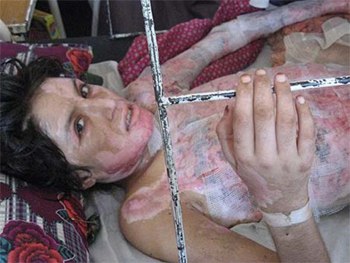KABUL: Of all her desires, Fahima, 17, longs most for a life free of violence.
"I was put into chains for a whole month by my father. I ran away twice but was returned home by the police. Everybody says I am the guilty one, that my father has the right to beat me," she said.
Fahima is far from alone in her experience. Hopes among Afghan women for a better future are waning as the violence against them continues.
- 87 percent of Afghan women are illiterate
- 30 percent of girls have access to education in Afghanistan
- 1 in every 3 Afghan women experience physical, psychological or sexual violence
- 44 years is the average life expectancy rate for women in Afghanistan
- 70 to 80 percent of women face forced marriages in Afghanistan
The Afghan Human Rights Commission recorded more violence against women in Kabul than in former Taliban regions.
Women's rights have fallen down the agenda below countering a growing insurgency, tackling opium production and confronting endemic corruption.
"Day by day the government's support for women's development fades," said Hangama Anwari, a member of Afghanistan's Independent Human Rights Commission (AIHRC).
In 2006, more than 1,650 cases of violence against women were registered with AIHRC.
And more than 550 women reported severe beatings and about 120 are documented as having committed suicide either by burning themselves to death or overdosing on painkillers.
While the Taliban are condemned for their treatment of women, the AIHRC recorded more cases of violence against women in the capital, Kabul, and in the western province of Herat than in Kandahar, once a Taliban stronghold.
"There are likely to be numerous unregistered cases of violence against women," said Dr Suraya Subhrang, women's rights commissioner at AIHRC.
In highly conservative Afghanistan, only a fraction of women dare to breach social taboos and publicly speak out against violence. They face social stigma if they appear at police stations and courts to claim their rights, Subhrang added.
"Women's development should not be compromised by security imperatives," said Adrian Edwards, a spokesman for the United Nations Assistance Mission in Afghanistan (UNAMA).
The situation for women is better in Kabul than elsewhere in the country.
"Changes in women's lives have occurred only in Kabul," said MP Soona Niloofar from Urozgan province.
Over the past five years, some 3,900 women have died during childbirth because of a pervasive lack of obstetric facilities.

Bora Gull Heha, 16 years old, lies in a hospital bed in Kandahar. When the abuse became intolerable, Heha took what she though was her only way out. She grabbed an oil lamp and set herself ablaze. (CP PHOTO/Stephanie Levitz)
In Urozgan and Zabul provinces in the south, more than 90 percent of girls are deprived of formal education. According to the UN Development Fund for Women (UNIFEM), about 90 percent of Afghan women are illiterate.
In the northern province of Faryab, 80 percent of women experience violence in their daily lives and lack access to basic health, education and justice services, according to Fawzia Raufi, an Afghan MP.
However, the Afghan government insists it is making progress towards gender equality despite there being three women serving in Afghanistan's interim and transitional administrations from 2002-2004 and now there being just one female minister in the cabinet.
And although 25 percent of Afghanistan's National Assembly is comprised of women, many female parliamentarians say the powerful lawmaking institution has been systematically dominated by men who oppose gender equity.
"Women get lesser opportunities to express their concerns in the Wolesi-Jirag [Lower House of parliament]. The speaker and administrative staff of the house think women do not have the capacity to engage in high politics," said Hawa Alam Noristani, a representative of the elected body from Nooristan province.
Fawzia Aminiy, head of department for legal affairs at Afghanistan's Ministry of Women's Affairs, is working towards an ambitious Millennium Development Goal on gender equality by 2020.
"We have already accomplished 20 percent of the targets set," she said.
But she believes a 50-year plan for achieving equality may be more realistic.
And the spread of media means that abuse of women is finally becoming a topic of discussion in Afghanistan.
"In the past, violence against women was immured within households. Now we all can hear and read about it," said Subhrang.
Day by day the governments support for women's development fades. Meryem Aslan, programme director for UNIFEM in Afghanistan, said that the prevailing economic hardship in the country was hindering progress towards equality for women.
"With or without the Taliban, Afghanistan was and still is a poor country," she said.



